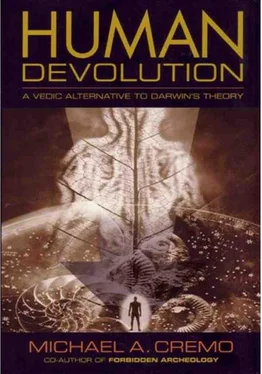Michael Cremo - Human Devolution - A Vedic Alternative To Darwin's Theory
Здесь есть возможность читать онлайн «Michael Cremo - Human Devolution - A Vedic Alternative To Darwin's Theory» весь текст электронной книги совершенно бесплатно (целиком полную версию без сокращений). В некоторых случаях можно слушать аудио, скачать через торрент в формате fb2 и присутствует краткое содержание. Год выпуска: 2003, ISBN: 2003, Издательство: Torchlight Publishing, Жанр: Старинная литература, на английском языке. Описание произведения, (предисловие) а так же отзывы посетителей доступны на портале библиотеки ЛибКат.
- Название:Human Devolution: A Vedic Alternative To Darwin's Theory
- Автор:
- Издательство:Torchlight Publishing
- Жанр:
- Год:2003
- ISBN:9780892133345
- Рейтинг книги:4 / 5. Голосов: 1
-
Избранное:Добавить в избранное
- Отзывы:
-
Ваша оценка:
- 80
- 1
- 2
- 3
- 4
- 5
Human Devolution: A Vedic Alternative To Darwin's Theory: краткое содержание, описание и аннотация
Предлагаем к чтению аннотацию, описание, краткое содержание или предисловие (зависит от того, что написал сам автор книги «Human Devolution: A Vedic Alternative To Darwin's Theory»). Если вы не нашли необходимую информацию о книге — напишите в комментариях, мы постараемся отыскать её.
Human Devolution: A Vedic Alternative To Darwin's Theory — читать онлайн бесплатно полную книгу (весь текст) целиком
Ниже представлен текст книги, разбитый по страницам. Система сохранения места последней прочитанной страницы, позволяет с удобством читать онлайн бесплатно книгу «Human Devolution: A Vedic Alternative To Darwin's Theory», без необходимости каждый раз заново искать на чём Вы остановились. Поставьте закладку, и сможете в любой момент перейти на страницу, на которой закончили чтение.
Интервал:
Закладка:
In common with other reviewers, Wodak and Oldroyd drew a connection between Forbidden archeology and the work of Christian creationists. “As is well known,” they noted (p. 192), “Creationists try to show that humans are of recent origin, and that empirical investigations accord with human history as recorded in the Old Testament. Forbidden archeology ( Fa ) offers a brand of Creationism based on something quite different, namely ancient Vedic beliefs. From this starting point, instead of claiming a human history of mere millennia, Fa argues for the existence of Homo sapiens way back into the Tertiary, perhaps even earlier.”
In l’anthropologie (1995 v.99, no. 1, p. 159), Marylène Pathou-Mathis wrote: “M. Cremo and R. Thompson have willfully written a provocative work that raises the problem of the influence of the dominant ideas of a time period on scientific research. These ideas can compel the researchers to orient their analyses according to the conceptions that are permitted by the scientific community.” She concluded, “The documentary richness of this work, more historical and sociological than scientific, is not to be ignored.” And in British Journal for the History of Science (1995 v. 28, pp. 377
–379), Tim Murray noted in his review of Forbidden archeology (p. 379): “I have no doubt that there will be some who will read this book and profit from it. Certainly it provides the historian of archaeology with a useful compendium of case studies in the history and sociology of scientific knowledge, which can be used to foster debate within archaeology about how to describe the epistemology of one’s discipline.” He further characterized Forbidden archeology as a book that “joins others from creation science and New Age philosophy as a body of works which seek to address members of a public alienated from science, either because it has become so arcane or because it has ceased to suit some in search of meaning for their lives.” Murray acknowledged that the Vedic perspective of Forbidden archeology might have a role to play in the future development of archeology. He wrote in his review (p. 379) that archeology is now in a state of flux, with practitioners debating “issues which go to the conceptual core of the discipline.” Murray then proposed,“Whether the vedas have a role to play in this is up to the individual scientists concerned.”
This openmindedness is characteristic of the reviews of Forbidden archeology that appeared in respected academic and scientific journals, the only exception being a particularly vitriolic attack by Jonathan Marks in american Journal of Physical anthropology (1994 v. 93, no. 1, pp.
140–141). Other than that, demands to totally exclude the Vedic perspective of Forbidden archeology from the discourse of science were confined to the publications of extremist groups, such as skeptics societies (whose skepticism does not extend to the theory of evolution) and the unremittingly anticreationist National Center for Science Education in the United States (misleadingly named so as to imply some governmental connection). Also in this category is an attempted book-length debunking by Michael Brass ( the antiquity of man ).
Wiktor Stoczkowski, reviewing Forbidden archeology in l’Homme (1995 v. 35, pp. 173–174), accurately noted (p. 173), “Historians of science repeat tirelessly that the Biblical version of origins was replaced in the nineteenth century by the evolution theory. In our imaginations, we substitute this simple story for the more complex reality that we are today confronted with a remarkable variety of origins accounts.” Among those accounts Stoczkowski included those of the Biblical creationists. “ Forbidden archeology ,” he added, “gives us one more, dedicated to ‘His Divine Grace A. C. Bhaktivedanta Swami Prabhupada’ and inspired by the Vedic philosophy that disciples study in the United States at the Bhaktivedanta Institute, a branch of the International Society for Krishna Consciousness.”
A favorable estimation of Forbidden archeology ’s Vedic roots was offered by Hillel Schwarz in Journal of unconventional History (1994 v.
6, no. 1, pp. 68–76). “ Forbidden archeology takes the current conventions of decoding to their extreme,” said Schwarz (p. 75).“The authors find modern Homo sapiens to be continuous contemporaries of the apelike creatures from whom evolutionary biologists usually trace human descent or bifurcation, thus confirming those Vedic sources that presume the nearly illimitable antiquity of the human race.” He added (p. 76), “Despite its unhidden religious partisanship, the book deserves a reckoning in this review for its embrace of a global humanity permanently distinct from other primates.” He accurately detected the book’s implicit thesis, namely, that “humanity is no mere biochemical exfoliation but a work of the spirit, in touch with (and devoted to) the ancient, perfect, perfectly sufficient, unchanging wisdom of the Vedic masters.”
In his book origin of the Human Species (2001), published by the academic publisher Rodopi in its series on Studies in the History of Western Philosophy, Dennis Bonnette, head of the philosophy department of Niagara University, said (p. 130): “Cremo and Thompson are not evolutionary materialists or Biblical creationists. They openly state Hindu affiliation as Bhaktivedanta Institute members. Following Vedic literature, they hold that the human race is of great antiquity, hundreds of millions of years old. For this reason, many critics attack Forbidden archeology, claiming its authors’ belief system precludes unbiased handling of the subject matter. Such personal attacks are unjust and unfounded. Every author has a philosophical stance which might, but need not, negate objectivity. Forbidden archeology’s historical evidence and argumentation stand on their own merits as sociological and epistemological critiques of contemporary paleoanthropology.”
As might be expected, Christian creationists have reacted favorably to Forbidden archeology . Peter Line, who reviewed the abridged version of Forbidden archeology in Creation Research Society Quarterly (1995 v. 32, p. 46) , said, “This book is a must reading for anyone interested in human origins.” After expressing his surprise at finding the book in a major U.S. chain store, Line noted that its “theoretical outlook is derived from the Vedic literature in India, which supports the idea that the human race is of great antiquity.” Line made clear that he did not share this view: “As a recent earth creationist, I would not accept the evolutionary time scale that the authors appear to accept. However, the authors have shown that even if you accept the evolutionary view of a vast age for the earth, the theory of human evolution is not supported.” Forbidden archeology also got positive reactions from some Islamic and Native American authors.
Interest in a Vedic perspective on human origins and a desire to hear more explicitly about it were constant themes in the academic reviews of Forbidden archeology. Kenneth Feder wrote in his Geoarchaeology review (pp. 339–340), “The authors are open about their membership in the Bhaktivedanta Institute, which is a branch of the International Society for Krishna Consciousness, and the book is dedicated to their ‘spiritual master,’ the group’s founder. They make a reasonable request regarding their affiliation with this organization: ‘That our theoretical outlook is derived from the Vedic literature should not disqualify it.’ Fair enough, but what is their ‘theoretical outlook?’” Human Devolution is my systematic answer to that question.
Читать дальшеИнтервал:
Закладка:
Похожие книги на «Human Devolution: A Vedic Alternative To Darwin's Theory»
Представляем Вашему вниманию похожие книги на «Human Devolution: A Vedic Alternative To Darwin's Theory» списком для выбора. Мы отобрали схожую по названию и смыслу литературу в надежде предоставить читателям больше вариантов отыскать новые, интересные, ещё непрочитанные произведения.
Обсуждение, отзывы о книге «Human Devolution: A Vedic Alternative To Darwin's Theory» и просто собственные мнения читателей. Оставьте ваши комментарии, напишите, что Вы думаете о произведении, его смысле или главных героях. Укажите что конкретно понравилось, а что нет, и почему Вы так считаете.












